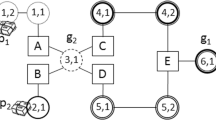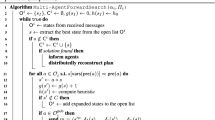Abstract
It is critical that agents deployed in real-world settings, such as businesses, offices, universities and research laboratories, protect their individual users’ privacy when interacting with other entities. Indeed, privacy is recognized as a key motivating factor in the design of several multiagent algorithms, such as in distributed constraint reasoning (including both algorithms for distributed constraint optimization (DCOP) and distributed constraint satisfaction (DisCSPs)), and researchers have begun to propose metrics for analysis of privacy loss in such multiagent algorithms. Unfortunately, a general quantitative framework to compare these existing metrics for privacy loss or to identify dimensions along which to construct new metrics is currently lacking. This paper presents three key contributions to address this shortcoming. First, the paper presents VPS (Valuations of Possible States), a general quantitative framework to express, analyze and compare existing metrics of privacy loss. Based on a state-space model, VPS is shown to capture various existing measures of privacy created for specific domains of DisCSPs. The utility of VPS is further illustrated through analysis of privacy loss in DCOP algorithms, when such algorithms are used by personal assistant agents to schedule meetings among users. In addition, VPS helps identify dimensions along which to classify and construct new privacy metrics and it also supports their quantitative comparison. Second, the article presents key inference rules that may be used in analysis of privacy loss in DCOP algorithms under different assumptions. Third, detailed experiments based on the VPS-driven analysis lead to the following key results: (i) decentralization by itself does not provide superior protection of privacy in DisCSP/DCOP algorithms when compared with centralization; instead, privacy protection also requires the presence of uncertainty about agents’ knowledge of the constraint graph. (ii) one needs to carefully examine the metrics chosen to measure privacy loss; the qualitative properties of privacy loss and hence the conclusions that can be drawn about an algorithm can vary widely based on the metric chosen. This paper should thus serve as a call to arms for further privacy research, particularly within the DisCSP/DCOP arena.
Similar content being viewed by others
References
Berry, P. M., Gervasio, M., Uribe, T. E., Myers, K., & Nitz, K. (2005). A personalized calendar assistant. In AAAI spring symposium on persistent assistants: Living and working with AI.
Bowring, E., Tambe, M., & Yokoo, M. (2005). Optimize my schedule but keep it flexible: Distributed multi-criteria coordination for personal assistants. In AAAI spring symposium on persistent assistants: Living and working with AI.
Brandt, F. (2001). Cryptographic protocols for secure second-price Auctions. In: Cooperative information agents V, lecture notes in artificial intelligence (LNAI). (Vol. 2182) (pp. 154–165).
Brandt, F. (2003). Fully private auctions in a constant number of rounds. In Proceedings of the 7th annual conference on financial cryptography (FC), (pp. 223–238).
Chalupsky, H., Gil, Y., Knoblock, C., Lerman, K., Oh, J., Pynadath, D., Russ, T., & Tambe, M. (2001). Electric elves: Applying agent technology to support human organizations. In International conference on innovative applications of artificial intelligence, (pp. 51–58).
Ephrati, E., Zlotkin, G., & Rosenschein, J. S. (1994). A non–manipulable meeting scheduling system. In Proceedings of the 13th international workshop on distributed artificial intelligence. Seattle, WA.
Franzin, M. S., Freuder, E. C., Rossi, F., & Wallace, R. (2002). Multi-agent meeting scheduling with preferences: Efficiency, privacy loss, and solution quality. In Proceedings of the AAAI workshop on preference in AI and CP. Edmonton, Canada.
M. S. Franzin E. C. Freuder F. Rossi R. Wallace (2004) ArticleTitleMulti-agent constraint systems with preferences: Efficiency solution quality and privacy loss Computational intelligence 20 IssueID2 264–286 Occurrence Handle10.1111/j.0824-7935.2004.00238.x Occurrence Handle2113290
Garrido, L., & Sycara, K. (1996). Multi-agent meeting scheduling: Preliminary results. In Proceedings of the 1996 international conference on multi-agent systems (ICMAS ’96), (pp. 95–102).
Hassine, A. B., Défago, X., & Ho, T. (2004). Agent-based approach to dynamic meeting scheduling problems. In Proceedings of the third international joint conference on autonomous agents and multi agent systems (AAMAS 2004), (pp. 1132–1139) New York, NY.
Hirayama, K., & Yokoo, M. (1997) Distributed partial constraint satisfaction problem. In G. Smolka (ed.), Principles and practice of constraint programming, (pp. 222–236).
Liu, J., & Sycara, K. P. (1996) Multiagent coordination in tightly coupled task scheduling. In Proceedings of the second international conference on multiagent systems, (pp. 181–187).
Maheswaran, R. T., Bowring, E., Pearce, J. P., Varakantham, P., & Tambe, M. (2004). Taking DCOP to the real world: Efficient complete solutions for distributed multi-event scheduling. In Proceedings of the third international joint conference on autonomous agents and multi agent systems (AAMAS 2004), (pp. 310–317) New York.
Maheswaran, R. T., Pearce, J. P., Varakantham, P., Bowring, E., & Tambe, M. (2005). Valuations of possible states (VPS): A unifying quantitative framework for analysis of privacy loss in collaboration. In Proceedings of the fourth international joint conference on autonomous agents and multi agent systems (AAMAS 2005), (pp. 1030–1037) Utrecht, The Netherlands.
Mailler, R., & Lesser, V. (2004) Solving distributed constraint optimization problems using cooperative mediation. In Proceedings of Third International Joint Conference on Autonomous Agents and Multiagent Systems (AAMAS 2004), (pp. 438–445) New York, NY.
Meisels, A., & Lavee, O. (2004). Using additional information in DisCSPs search. In Proceedings of the 5th workshop on distributed constraints reasoning (DCR-04). Toronto, CA.
Modi, P. J., Shen, W., Tambe, M., & Yokoo, M. (2003). An asynchronous complete method for distributed constraint optimization. In Proceedings of the second international conference on autonomous agents and multi-agent systems, (pp. 161–168).
Modi, J. P., & Veloso, M. (2005). Bumping strategies for the multiagent agreement problem. In Proceedings of the fourth international joint conference on autonomous agents and multi agent systems (AAMAS 2005), (pp. 390–396). Utrecht, The Netherlands.
Naor, M., Pinkas, B., & Sumner, R. (1999). Privacy preserving auctions and mechanism design. In Proceedings of the first ACM conference on electronic commerce, (pp. 129–139).
Paruchuri, P., Tambe, M., Dini, D., Kraus, S., & Ordonez, F. (2005). Safety in multiagent systems via policy randomization. In AAMAS workshop on safety and security in multiagent systems.
N. Sadeh M. S. Fox (1996) ArticleTitleVariable and value ordering heuristics for the job shop scheduling constraint satisfaction problem Artificial Intelligence 86 1–41 Occurrence Handle10.1016/0004-3702(95)00098-4
P. Scerri D. Pynadath M. Tambe (2002) ArticleTitleTowards adjustable autonomy for the real-world Journal of Artificial Intelligence Research 17 171–228 Occurrence Handle2003m:68157
S. Sen (1997) ArticleTitleDeveloping an automated distributed meeting scheduler IEEE Expert: Intelligent Systems and Their Applications 12 IssueID4 41–45
Silaghi, M. (2004). Meeting scheduling guaranteeing n/2-privacy and resistant to statistical analysis (applicable to any DisCSP). In 3rd IC on web intelligence, (pp. 711–715).
Silaghi, M. C., & Faltings, B. (2002). A Comparison of distributed constraint satisfaction approaches with respect to privacy. In Proceedings of the 3rd workshop on distributed constraints reasoning (DCR-02). Bologna, Italy.
Silaghi, M. C., & Mitra, D. (2004). Distributed constraint satisfaction and optimization with privacy enforcement. In Proceedings of the 2004 IEEE/WIC/ACM international conference on intelligent agent technology (IAT 2004), (pp. 531–535) Beijing, China.
Silaghi, M. C., Sam-Haroud, D., & Faltings, B. (2001). ABT with asynchronous reordering. In Second Asia-Pacific conf. on intelligent agent technology, (pp. 54–63) Maebashi, Japan.
van Otterloo, S. (2005). The value of privacy: optimal strategies for privacy minded agents. In Proceedings of the fourth international joint conference on autonomous agents and multi agent systems (AAMAS 2005), (pp. 1015–1022) Utrecht, The Netherlands.
M. Yokoo E. H. Durfee T. Ishida K. Kuwabara (1998) ArticleTitleThe distributed constraint satisfaction problem: formalization and algorithms IEEE Transactions on Knowledge and Data Engineering 10 IssueID5 673–685 Occurrence Handle10.1109/69.729707
Yokoo, M., & Hirayama, K. (1996). Distributed breakout algorithm for solving distributed constraint satisfaction and optimization problems. In Proceedings of the second international conference on multiagent systems, (pp. 401–406) Kyoto, Japan.
Yokoo, M., Suzuki, K., & Hirayama, K. (2002). Secure distributed constraint satisfaction: Reaching agreement without revealing private information. In Proceedings of the 8th international conference on principles and practice of constraint programming (CP 2002, LNCS 2470), (pp. 387–401) Ithaca, NY.
Author information
Authors and Affiliations
Corresponding author
Rights and permissions
About this article
Cite this article
Maheswaran, R.T., Pearce, J.P., Bowring, E. et al. Privacy Loss in Distributed Constraint Reasoning: A Quantitative Framework for Analysis and its Applications. Auton Agent Multi-Agent Syst 13, 27–60 (2006). https://doi.org/10.1007/s10458-006-5951-y
Published:
Issue Date:
DOI: https://doi.org/10.1007/s10458-006-5951-y




